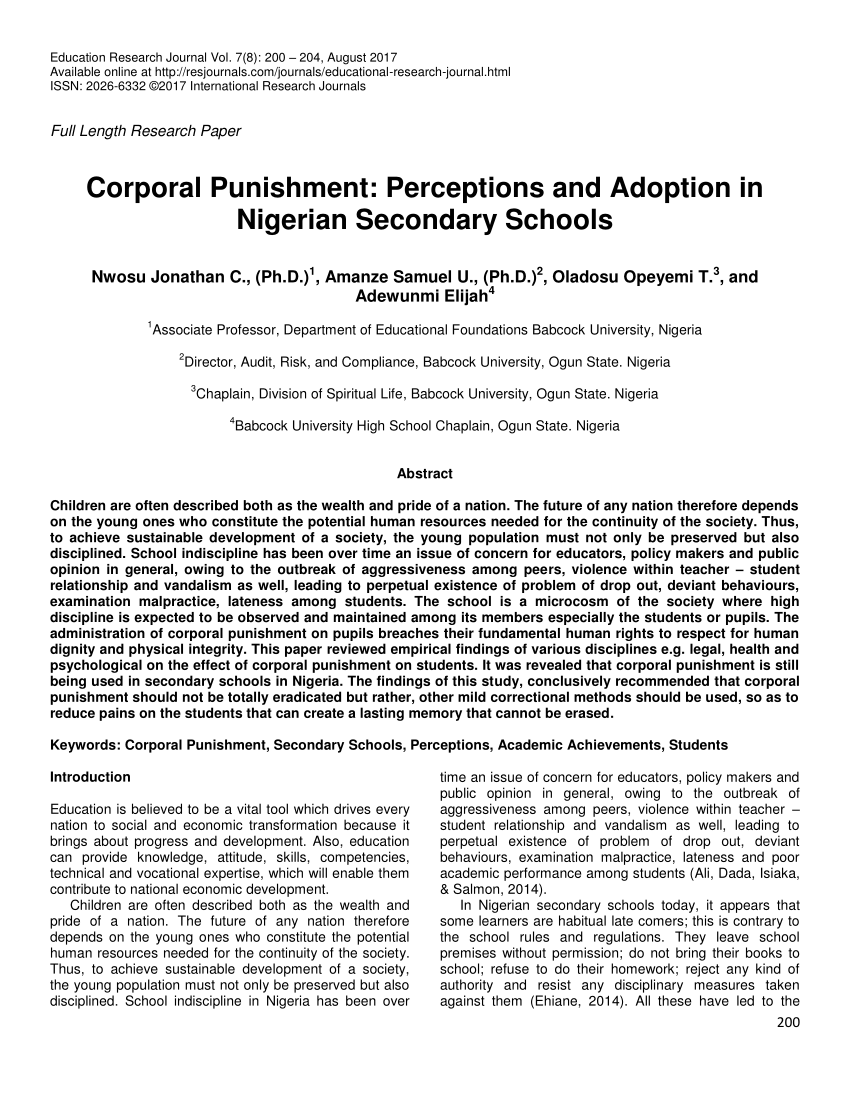The decision by the Ogun State Government to shut down Obada Grammar School, Obada, Idi-emi over the tragic death last Friday, of an SS2 student, Monday Arijo, as a result of corporal punishment inflicted by a teacher is a chilling reminder of the dark reality of archaic disciplinary practices that persist in some Nigerian schools. This obnoxious practice, masquerading as “discipline,” has once again highlighted the urgent need for a complete ban on this barbaric, and inhumane practice. This incident is not just a wake-up call; it is a deafening alarm that demands immediate action from all stakeholders and society at large. It underscores the urgent need for comprehensive reform in Nigeria’s education system, and particularly in how discipline is handled within classrooms. To teachers, administrators, and policymakers of Nigeria, let this tragedy be a turning point. A child lost his life in a place where he was supposed to be protected and nurtured. This loss is a stain on Nigeria’s educational system, a reminder that urgent reform is more than just a moral imperative. The time for a zero-tolerance policy against corporal punishment is now; any hesitation is a passive acceptance of the ongoing abuse and violation of students’ rights, dignity, and, most grievously, their lives.
To fail to act now would be to condone a culture of violence and perpetuate a system that sacrifices children’s futures and lives for the sake of anachronistic disciplinary practices. Ogun State Governor, Dapo Abiodun, who ordered the school closure also directed that a panel be set up to investigate the circumstances that led to the unfortunate incident, promising that those liable would face the full wrath of the law. The teacher allegedly responsible for the death of the student has been suspended and arrested and the school principal, Tamrat Onaolapo, who was issued a query for allowing corporal punishment to be used against established rules and regulations in the state, has also been suspended. On Tuesday, Ogun State government sent a second delegation led by the Commissioner for Education, Science and Technology, Prof. Abayomi Arigbabu to commiserate with the family, as the Federal Medical Center, Abeokuta is conducting a post-mortem on the deceased to determine the cause of his death.
Corporal punishment in schools is not discipline; it is a form of violence imposed under the guise of correction that inflicts physical pain and psychological trauma on students. This practice, which involves teachers physically beating students, often with canes, sticks, belts, and even bare hands is outdated, ineffective, and brutal. It is a method rooted in the misguided belief that fear and pain are effective tools for discipline. Numerous studies, countless real-life examples and research from organizations like UNICEF have shown that corporal punishment has adverse psychological, physical, and emotional impacts on children; it creates trauma, instills fear, and perpetuates a toxic environment that hinders learning. Furthermore, it is not only ineffective but also deeply harmful, as it fosters resentment and perpetuates a culture of violence, creating a lasting impact on students long after leaving the classroom.
The death of Monday Arijo is the most extreme and heartbreaking consequence, but many others suffer in silence, bearing physical and emotional scars that can last a lifetime. In the case of Ogun, where corporal punishment claimed the life of young Arijo, the consequences are painfully clear. What’s most tragic is that this was entirely avoidable. This young boy’s life was cut short in a space that should have been safe and supportive – a place to learn, grow, and thrive. Despite the severity of this issue, cases of abuse in schools are often downplayed, ignored, or even justified. Teachers and school administrators who believe in the disciplinary “value” of corporal punishment often defend these actions, dismissing the concerns of students and parents. In some instances, students even feel compelled to accept these abuses, having been conditioned to believe that such punishment is a normal part of education. It is a culture of silence and normalization of abuse that enables such atrocities to continue unchallenged.
The psychological impact of corporal punishment cannot be overstated. Students subjected to physical punishment often experience anxiety, depression, and a diminished sense of self-worth. These effects can hinder their academic performance and social development, leading to a cycle of failure and frustration. Every child has the right to a safe and supportive learning environment. Corporal punishment is a blatant violation of this right. It undermines the dignity and respect that every student deserves and creates an atmosphere of fear and mistrust. In a society that values human rights and the well-being of its citizens, there is no place for such barbaric practices. Teachers, parents, and policymakers must come to terms with a sobering truth: there is no educational benefit in beating a child. Corporal punishment is an abuse of authority, a denial of a student’s rights, and it tarnishes the dignity of education itself. No teacher, no matter their intentions, should be granted any authority to subject students to physical pain, let alone violence with lethal consequences.
The Nigerian government’s failure to ban corporal punishment in schools is an appalling disregard for children’s rights and safety. Despite mounting evidence of its devastating effects—including physical harm, psychological trauma, and even death—the government has not enforced a zero-tolerance policy nationwide. This inaction perpetuates a culture of violence within schools, robbing children of a safe learning environment. While laws like the Child Rights Act aim to protect children, they remain inconsistently enforced, putting countless young lives at risk. It’s high time Nigeria demonstrates a commitment to humane discipline by abolishing corporal punishment in all educational settings.





